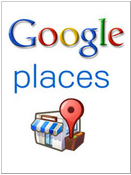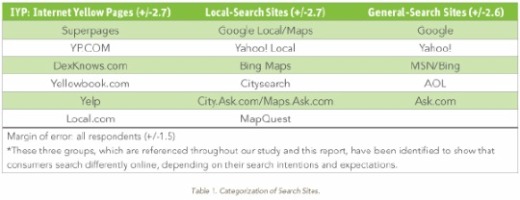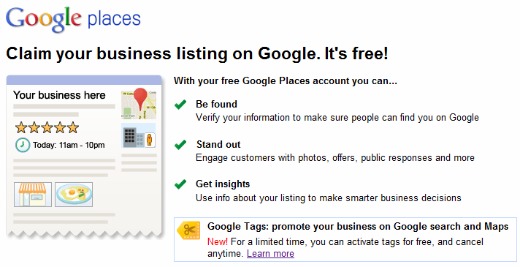“Eighty percent of success is showing up.” ~ Woody Allen  Let’s say you own a café in San Francisco. What if a prospect showed up at your store and neither you nor your staff was there to greet her, wasn’t there to let her sample your seasonal products such as a peppermint mocha or eggnog muffin, wasn’t there to entice her with 30 minutes of tranquility over a cup of tea and a new magazine? This prospect showed a specific interest in what you have to sell by showing up at your door and yet you weren’t around to learn of the opportunity let alone capitalize upon it. Now what if that same prospect jumped online and entered the search term ‘San Francisco Chestnut Street Café’ because she planned to do some holiday shopping in the Marina District? Or even more tellingly, was on Chestnut Street using her mobile phone to search for a nearby café? Are you showing up in this case? If you haven't claimed your business listing at Google Places, you may not be showing up for the online prospect.
Let’s say you own a café in San Francisco. What if a prospect showed up at your store and neither you nor your staff was there to greet her, wasn’t there to let her sample your seasonal products such as a peppermint mocha or eggnog muffin, wasn’t there to entice her with 30 minutes of tranquility over a cup of tea and a new magazine? This prospect showed a specific interest in what you have to sell by showing up at your door and yet you weren’t around to learn of the opportunity let alone capitalize upon it. Now what if that same prospect jumped online and entered the search term ‘San Francisco Chestnut Street Café’ because she planned to do some holiday shopping in the Marina District? Or even more tellingly, was on Chestnut Street using her mobile phone to search for a nearby café? Are you showing up in this case? If you haven't claimed your business listing at Google Places, you may not be showing up for the online prospect.  Not only are shoppers looking online for where to shop with increasing frequency, but the 800 pound gorilla in the search world, Google, with its estimated 83% search engine market share has recently made a number of changes to its search results and display (called SERP for search engine results page) by announcing Google Place Search which in many cases places a greater emphasis than before on returning local search results. In order to take advantage of these changes, you need to claim your business listing at Google Places. For now, this is a great opportunity for locally owned retailers to improve their chances of attracting prospects by being found within relevant search terms and business category descriptions. If you have not yet claimed your Google Places business listing, or if you have but have not tricked it out yet, let’s look at some data to understand why it’s important to do so. Prospects are looking for your services online A recent study about online search behavior sheds compelling data on how most of your prospects are looking for your store’s services. Local Search Usage Study: Bridging The Caps, From Search to Sales was published in September, 2010 and it “attempts to understand how consumers use and value search engines, print and Internet Yellow Pages, local-search sites, emerging media and more.” According to this study, “the majority of local-business searches are conducted online, with 70 percent of consumers citing online sites as their primary sources. That is up seven percentage points from 2009.” Furthermore, “search engines comprise more than 60 percent of the online-search market share.”
Not only are shoppers looking online for where to shop with increasing frequency, but the 800 pound gorilla in the search world, Google, with its estimated 83% search engine market share has recently made a number of changes to its search results and display (called SERP for search engine results page) by announcing Google Place Search which in many cases places a greater emphasis than before on returning local search results. In order to take advantage of these changes, you need to claim your business listing at Google Places. For now, this is a great opportunity for locally owned retailers to improve their chances of attracting prospects by being found within relevant search terms and business category descriptions. If you have not yet claimed your Google Places business listing, or if you have but have not tricked it out yet, let’s look at some data to understand why it’s important to do so. Prospects are looking for your services online A recent study about online search behavior sheds compelling data on how most of your prospects are looking for your store’s services. Local Search Usage Study: Bridging The Caps, From Search to Sales was published in September, 2010 and it “attempts to understand how consumers use and value search engines, print and Internet Yellow Pages, local-search sites, emerging media and more.” According to this study, “the majority of local-business searches are conducted online, with 70 percent of consumers citing online sites as their primary sources. That is up seven percentage points from 2009.” Furthermore, “search engines comprise more than 60 percent of the online-search market share.”  If 70% of consumers are looking for you online, and the majority of these people are using search engines to do so, then it’s critical that you make sure you can be found on Google. Google has made changes to its search results that place greater importance on local listings Google claims that 20% of all searches are for a local business. Additionally, with the rapid growth of smart mobile phones, some estimate that as many as 20% of all online searches will be from a mobile phone by 2012. Google is setting itself up to capitalize on this growth. As a result, it’s launched Google Places search. Google states: “Place Search results will begin appearing automatically on Google when we predict you’re looking for local information.” What happens with its results after it shifts into Places search? Some of the key changes in the results pages are now:
If 70% of consumers are looking for you online, and the majority of these people are using search engines to do so, then it’s critical that you make sure you can be found on Google. Google has made changes to its search results that place greater importance on local listings Google claims that 20% of all searches are for a local business. Additionally, with the rapid growth of smart mobile phones, some estimate that as many as 20% of all online searches will be from a mobile phone by 2012. Google is setting itself up to capitalize on this growth. As a result, it’s launched Google Places search. Google states: “Place Search results will begin appearing automatically on Google when we predict you’re looking for local information.” What happens with its results after it shifts into Places search? Some of the key changes in the results pages are now:
- Local results now fill the page and are highlighted and more obvious than general organic search results
- Results for business include links to both reviews and to the business’ Google Places page
- Results for businesses include photos and in some cases, snippets of your customer reviews
- There are a lot more links to click on within each listing to allow for comparison shopping
- A clickable local area map with more shopping options appears to the right of these results
- Paid ads on the top of the page (which some speculate are Google Boost ads) are more prominent than before
With the addition of links to reviews, inclusion of partial reviews and of photos, and to some degree the enhanced placement of paid Boost ads at the top of the page, it appears as if not only has Google made it a prerequisite for you to claim your Places page, but it has created a potentially more competitive landscape in attracting attention from your prospects. After all, Google wants to deliver the most relevant and helpful information and links to consumers. And I suspect that just as was the case with the differences between organic and paid search, local businesses will have the opportunity to improve its search results through organic methods or through paid methods.  After claiming your listing, the next obvious opportunity is to improve your listing in ways that can separate you from the competition. Whether this is by buying a Boost ad or adding better pictures or adding video to your listing or adding Google Tags to your listing or working to improve your customer reviews. Go claim your listing now. This simple, free act may provide you with more positive results than anything else you do today.
After claiming your listing, the next obvious opportunity is to improve your listing in ways that can separate you from the competition. Whether this is by buying a Boost ad or adding better pictures or adding video to your listing or adding Google Tags to your listing or working to improve your customer reviews. Go claim your listing now. This simple, free act may provide you with more positive results than anything else you do today.